As a nation, the U.S.’s demand for organic vegetables exceeds our supply. This has created an organic supply shortage. For years, growers have not been able to grow enough to meet demand and organic prices continue to rise. Hydroponics in several forms (including aquaponics) is currently eligible for organic certification, with a number of facilities in operation and growing interest in alternative food systems. Our position is that hydroponics can contribute to the demand for organic foods, increase access at affordable prices, and offer many benefits to our entire food system.

Unfortunately, the National Organic Standards Board has sent signals that it may recommend that the USDA revoke hydroponics’ organic eligibility in the near future.
This article will detail the effect of supply shortages on organic prices and the benefits of including soil-free, container, and hydroponic systems on the organic program
The Organic Price Premium
The massive supply shortage for organic, hydroponic-friendly vegetables can been seen in the September 2017 USDA Market Data:

These price premiums (the percentage by which a product’s selling price exceeds or falls short of a benchmark price) of over 50% on conventional vs. organic vegetables are very significant and indicate a very low supply of organic. In an ideal economic scenario, new growers and investors would see these high organic price premiums and enter the market. Supply would increase and prices would drop. This is how supply, demand, and Adam Smith’s Invisible Hand operate.
In order to meet this surging demand domestically, we need to embrace a diversity of growing practices.

Photo Credit: William Iven
Enter hydroponics, aquaponics, and other soil-free systems.
The irony of the organic vegetable supply shortage is that a solution exists and is already eligible: hydroponics and related soil-free growing methods.
A number of hydroponic farms have been certified organic for over a decade. A 2016 USDA survey found that across the U.S. there were 30 certified organic hydroponic operations, and 22 certified organic aquaponic operations. (See page 20 of NOSB April 2016 Meeting Document)

Photo Credit: Olu Eletu
Hydroponic farms have shown that they can efficiently produce large quantities of high-quality organic vegetables in both rural and urban environments.
Mixed Signals and Missed Opportunities on Organic Hydroponics
For the history of the NOSB’s consideration of organic hydroponics, see pages 63 – 69 of the NOSB Fall 2017 Meeting Discussion Document.

Photo Credit: Zoe Deal
For that mid-20s urban farmer mapping out his/her first business plan, the 50% price premium on organic kale will make the difference between either building that hydroponic rooftop greenhouse or taking their skills elsewhere. That hypothetical hydroponic rooftop greenhouse would have created three full-time jobs within a quarter-mile radius and fed many people super-fresh, super-local, year-round kale in the middle of a city… isn’t that the direction we want to go?
NOSB Clarity on Organic Hydroponics Would Benefit the Entire Food System
If the NOSB sends a clear signal that hydroponics is indeed fully eligible for organic certification, we expect to see more resources available for hydroponic growing.

Photo Credit: Matt Montgomery
The increase of hydroponic growing will bring benefits to everyone across our food system:
- Growers: Organic hydroponic growers will have more financial resources and stability. Industry growth will bring technological advancements and improved knowledge, skilled labor, and better industry infrastructure. Also, land-locked soil growers will be able to expand their business without expanding acreage.
- Consumers: Consumers will have access to more organic vegetables as more growers enter the market. The increased supply will make organic prices cheaper.
- Environment: All people are affected by our food system because it affects our environment. Hydroponics can grow food faster and more efficiently than soil which will produce nationwide environmental benefits from using less resources and growing closer to home.
- Workers: Hydroponics can create thousands of year-round jobs even in food deserts and drought-stricken areas.
Make Your Voice Heard
Hydroponics and other soil-free systems can meet the demand for organic vegetables and keep prices lower. Transitioning to more hydroponic production can also improve our environment and economy.
The NOSB can usher in these benefits by stating clearly that hydroponic and other soil-free growing methods remain eligible for organic certification.
The comment period for the NOSB’s recommendations to the USDA are now closed. To view comments, click here.



Interesting but not suprising